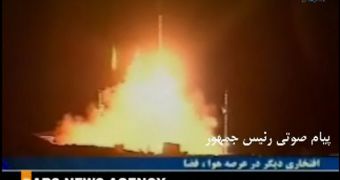Media reports in Iran indicate that the country may have just launched its second satellite ever. The spacecraft, designed and built by Iranian scientists, took off aboard a Safir delivery system yesterday, June 15, reports currently making the rounds show.
The Iranian government has tasked the Islamic Republic News Agency (IRNA) with making some of the details related to the launch public. The agency was keen to underline the fact that the satellite will be used for peaceful purposes, and that it has no military applications.
Its job will be to map and monitor our planet from a low-Earth orbit (LEO), at a mean altitude of about 162 miles (260 kilometers). The spacecraft is called Rasad-1 (Observation-1). Like the rocket that carried it, the spacecraft is made in Iran, Space reports.
The Islamic nation has a tremendously ambitious space program, which calls for the launch of a manned spacecraft by 2020. Five years later, the country intends to put a human on the Moon, at around the same time China will finish its space station, and maybe send a taikonaut to the Moon too.
“Rasad satellite’s mission is establishing contact with Earth stations, obtaining orders from those stations, image taking from the Earth and dispatching those images along with telemetry information back to the Earth stations,” an IRNA report indicates.
It adds that the spacecraft is rather small, weighing in at around 34 pounds, or little more than 15 kilograms. It is very similar to the Omid (Hope) satellite, that Iran launched in February 2009. That was the country's first-ever successful foray into satellite technology.
After news of the new launch hit, Western analysts expressed concerns about the new capabilities Iran is exhibiting. The country is suspected of working towards developing nuclear weapons and the means to deliver them.
In this light, having a rocket that can put satellites in orbit is a gold mine, since the system could easily be reconverted to an inter-continental ballistic missile (ICBM). All of the rockets Iran currently develops could potentially carry warheads.
Western nations suspect that the country's civilian nuclear program is just a front for researching nuclear weapon technologies. This far, Iranian authorities have dismissed these suspicions vehemently, saying that they only use the reactors for peaceful purposes.
The “successful launching of Rasad is another long stride towards fixing the presence of the Islamic Republic of Iran in the space,” IRNA adds in the reports. The Iranian government wants to make the country one of the world's leaders in space technologies.

 14 DAY TRIAL //
14 DAY TRIAL //